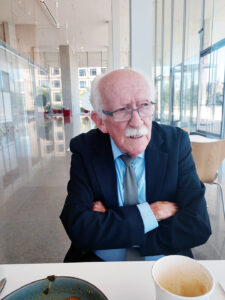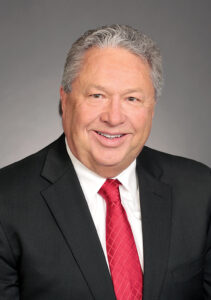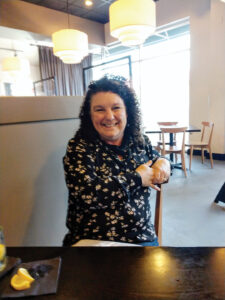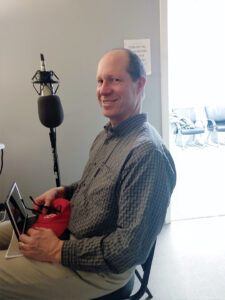Summer jobs — they work!
5/31/2023Times are changing in the workplace. Overall, young people are less eager to join the labor market than previous generations, particularly since COVID shutdowns. Many companies are turning to retired, part-time workers because they say they have a more serious work ethic. Traditional first jobs for young people, like shoveling snow or mowing lawns, are now often done by big service companies.
The restaurant business particularly has been affected because, in Iowa, more than a third of all people experienced their first jobs in that industry and more than half have worked there.
This story is an ode to work, a celebration of first jobs, summer jobs and part-time jobs.

Elvin McDonald of Des Moines took the Ben Franklin path, at an even earlier age than Ben.
First jobs and destiny
Sometimes, first jobs are so perfect they dictate one’s destiny. After selling an essay at age 16, Ben Franklin ran away at 17, found his way to Philadelphia and took a job at a printer’s shop, where he began publishing more essays.
Des Moines’ paragon of style and author of 75 books, Elvin McDonald, followed the Franklin plan at a younger age. He published his first story in the New York Times at age 14, from the Oklahoma Panhandle. By the time he started college at 18, he was a full editor at Macmillan.
Auto pioneer Henry Ford began working in a small machine shop at age 12. He ended up equipping the shop himself. That got him his next job, and he became a machinist’s apprentice in Detroit.
Microsoft founder Bill Gates’ first job was as a computer programmer for TRW in his senior year of high school. Walt Disney landed his first job, at 17, as a cartoonist for Kansas City Film Ad Company.
A journey of a thousand miles begins with one step
Sometimes a first job opens one’s eyes to more appropriate vocations. Original steel magnate Andrew Carnegie began working in a textile factory at 13 as a bobbin boy (changing spools of thread). He soon left that job for a better one, tending to a steam engine in a factory that he left for a job as a railroad telegrapher. In all jobs, he learned that iron was essential to rails, engines and bridges, and that steel worked better than iron.
Apple founder Steve Jobs began working at 12. He found Hewlett Packard founder Bill Hewlett’s number in the Palo Alto telephone book and called him. According to “Wired,” he asked Hewlett to give him “a part for a frequency counter he was building.” Hewlett offered the eighth-grader a summer job.
Tom Edison’s first job, at 13, was selling newspapers on a train that ran between Port Huron and Detroit. By the time the Civil War began, that led to a job in a telegraph office at a time when the only electricity was generated by primitive batteries, and telegraph communication was essential to the war effort and to running railroads.
The slow food movement’s American guru, Alice Waters, spent her teenage summers slinging fried chicken and biscuits as a carhop in Michigan City, Indiana. The next summer, she ran a hot dog stand.
Pure serendipity
Sometimes the connection to destiny is just serendipitous. Elvis Presley worked as a delivery man for an electrical shop and wanted to become an electrician, but while still 17, Sam Phillips let him record a song at Sun Studios, which had been on Elvis’ delivery route. Steve McQueen was supporting himself in amateur theater by working in a motorcycle repair shop. One of his customers was Marlon Brando.
Alfred Hitchcock began working as a technical copywriter. He so wanted to work in the silent movies that he took a pay cut to work as a titles designer. Clark Gable’s first job was on an oil rig in Ohio. He learned that drillers were fearless nomads, so he had no worries about running away to Hollywood.
Sometimes the connection between a first job and destiny is even less obvious. Disney’s most successful CEO, Mike Eisner, found his first job at 16 as a summer camp counselor, making $100 for eight weeks in Vermont. He told Forbes that the job was pivotal, teaching leadership lessons. “I remember making it through things like rainstorms and big waves in the water. Those issues made an enormous impact on me.”
Learning what you don’t want to do
Other times, first jobs teach mostly that there is something better to do with one’s life. Abe Lincoln’s first job was on a ferryboat when he was 17. Ulysses S. Grant began working in a leather goods shop at 16.
McDonald’s owner Ray Kroc began working at 15, as an ambulance driver in WWI. Probably the most famous WWI ambulance driver, Ernest Hemingway, left his first job at the Kansas City Star to join the war effort. That led to “A Farewell to Arms.”
Elon Musk joined the work force working odd jobs in lumber mills and on farms in Saskatchewan until he was admitted to college. Former Secretary of State Madeleine Albright’s first gig was selling bras at Jocelyn’s Department Store in Denver. Another former Secretary of State, Hillary Clinton, joined the work force as a fish gutter in Alaska. She was fired within a week.
Oscar-winner Christopher Walken found his first job at 16, as a lion tamer. Comedian Amy Poehler began working as an ice cream scooper. She told the New Yorker she liked the “performance aspect” of the job but hated the rest of it.
Amazon founder Jeff Bezos spent childhood summers repairing windmills and castrating bulls on a grandparent’s farm. Later, after a teenage summer stint at McDonald’s, he and his then-girlfriend created an educational camp for younger kids.
Film maker Richard Linklater (“Dazed and Confused”) owes his movie-making career to a summer gig on a Texas oil rig. It paid his way through college and gave him ample time to read.
Ben Bernanke, the former chair of the Federal Reserve, spent his Harvard summers home in South Carolina, waiting tables at the mega roadside attraction South of the Border.
New Yorker magazine star Philip Gourevicht spent a youthful summer as a bear-skinner in the Wyoming Rockies. “I moved through life back then with a dauntlessness born of cluelessness,” he wrote in that magazine.

Iowa Business Hall of Famer Rick Tollakson mowed lawns, walked beans, detasseled corn, baled hay, babysat, and bussed tables as a youth.
Local angle on first jobs
We asked several local leaders about their first jobs. Rick Tollakson is an Iowa Business Hall of Famer and president/CEO of Hubbell Realty.
“I grew up in a small, rural Iowa town, and I had several jobs. I mowed lawns, walked beans, detasseled corn, baled hay, babysat, bussed tables in a restaurant, and I was our church janitor, so I had to clean the church every weekend.
“My first real, full-time summer job did not happen until I graduated from high school when I worked as a depot agent for the Rock Island Railroad. I filled in for depot agents when they went on vacation. I was on my own, so it taught me a lot about self-reliance and confidence. I think it is important for young people to experience several different work situations, as it better prepares them to understand the overall job market and what kind of things they may like and don’t like about that particular work environment.”
Jessica Dunker heads up both the Iowa Restaurant Association and the Iowa Hotel and Lodging Association.
“I started like most Iowa kids in a corn field as a detassler. I made great summer money, but it was damn hard work. My first job at 16 was in the concession stand at the Palace Movie Theater in Mason City. I worked there until it was torn down to make a mall. I then went to Long John Silvers as a cashier and food runner.
“All three of those jobs taught me valuable skills about teamwork, listening to a boss, dealing with unlikable coworkers, making change (a seemingly lost skill), and, in the restaurant, I learned about food safety. Actually working in a restaurant made me feel better about eating in restaurants because I learned all of the food safety protocols first hand — as well as about portioning and profitable versus loss leader menu items and how to do suggestive upselling.
“In short, working from age 14 was instrumental in helping see how much purpose, independence, and financial gain I could make happen for myself.”
Jon Hoak is a Roosevelt and Drake Law School grad who was CLO of NCR and the nation’s first Chief Ethics Officer for Hewlett Packard.
“My best and worst jobs were at my dad’s lumber yard, unloading boxcars of lumber with the regulars and a few friends. Back in the 1950s, my dad used to ‘hire’ some Iowa football players to work there who got paid a lot of money for very little work — and then the world changed — pre-NIL. Now we are back to the same situation. My best summer job was actually going door to door selling cable TV subscriptions in Des Moines. Great way to learn your city and do people watching. Saw all kinds.

Jessica Dunker of Iowa Restaurant Association says there is much to learn in a first job at a restaurant.
“Mostly summer was about self-improvement — speed-reading classes and golf. Both served me well in business.”
Tim Hall, one of 15 children of a mail carrier, was the youngest-ever majority party leader of the Nebraska Legislature. He turned to business and became the head of Medico, which he merged with American Republic to create AEG in Des Moines.
“When I was a freshman in high school, near the end of the year, an announcement came over the PA saying that the City of Omaha had summer jobs for students, and applications were available. I went down to the office after class to get an application, but the administrator/principal, Fr. Duffy, told me he had a job for me at the parish he was in residence at. It paid $1.50 an hour. Serious cash in 1970!
“I had to go downtown to St. Mary Magdalene Parish and interview for the job with Fr. Kelligar. I was basically a janitor, altar boy and breakfast cook at a Catholic rectory with three priests and a rector named Mark Ferrell, another Irishman. The fourth member of this holy quartet was Fr. Benliro, who was a native of the Philippine Islands and now a U.S. citizen. All three priests were educators, and Fr. Kelligar was the editor of the local weekly Catholic paper ‘The True Voice.’
“Well, to say I learned a lot from that group is an understatement. Every breakfast was a class in debate on the topics of the day. I would cook their breakfast, and they would go at each other on politics, sports, the economy, you name it. They chewed on every topic while chewing on their breakfast.
“In addition to using my culinary skills, I had to help maintain the church. The job turned into not just a summer job but year-around employment. I stayed at ‘Mag’s’ through my time in college. In the summers, I tore out concrete on the sidewalk in front of the church, painted just about anything that didn’t move, fixed plumbing and everything in between. I learned a number of lifelong skills that still help me to this day.
“They were a fun bunch of guys who taught me much, and I still laugh about some of the stories I can’t share because of the ‘vow of silence’ I had to take when I went to work there.”

A chance to work part time at Living History Farms changed Leo Landis’ life.
Leo Landis is State Curator, State Historical Society of Iowa, and Museum Curator, State Historical Museum of Iowa.
“My first job was in high school working as a dishwasher/prep cook at Echo Valley Country Club. My boss, who happened to be my brother John, taught me some basic knife skills that are still important, and to always look for something that needed to be done when there was a lull. I eat much better because of knowing how to use a knife, and it instilled in me to find ways to add value to my workplace and not stand around waiting for the next cart/bus tub of dishes or prep task to be assigned, but take initiative.
“In my college summer break of 1986, I was History Interpreter Intern at Living History Farms. It changed my life to work under Iowa Historian Tom Morain; another great person and museum professional named Dave Miles; and a great bunch of museum workers including Mary Schmidt and Mike Witmer. I learned so much about museum work and Iowa history. Instead of being a teacher in a K-12 setting, I became a museum educator/curator/historian and have had an enriching career.”
George Formaro owns five Iowa restaurants and South Union Bakery.
“During one of my first summer jobs, I had the extraordinary opportunity to work at Felix & Oscar’s, now known as F&O’s. Being a dishwasher and busboy at the original location felt like a dream come true. The kitchen was scorching hot, making it one of the most intense culinary environments I had experienced. Little did I know that this job would mark the beginning of my 41-year journey in the restaurant business.
“My responsibilities encompassed both bussing tables and washing dishes, which presented a challenging and messy task. On weekends, the late nights stretched into the early morning hours, and I’m forever grateful to my father for picking me up past 1 a.m. on Fridays and Saturdays. However, it wasn’t solely a job of toil and drudgery. I often found myself lingering in the kitchen, surrounded by the talented cooks. Whenever they took a smoke break, I stepped in to cover their duties, eager to lend a hand. This gave me an advantage, and when a cook failed to show up one day, I received the call to step up and fill the void.
“The greatest reward from this experience wasn’t just the invaluable knowledge I gained, but also the proximity to one of my favorite pizzas in Des Moines.”
The restaurant industry wants you
Are restaurant jobs helpful to one’s life plan?
“The restaurant industry trains the state’s workforce for whatever’s next,” explains Dunker. “Students learn to put down their phones, put on a smile, and speak to customers. They learn, firsthand or observationally, how to handle difficult or unhappy customers. They learn how important it is for every team member to show up because an unexpected absence puts a huge burden on the people who did come to work. They learn what it feels like to be relied upon to do what they’ve been assigned to do and to help those around them.”
“I know sports teach people how to be part of a team, but not every athlete gets to play. In the restaurant industry, everyone has an important role and everyone gets to perform that role, every time they come in.” ♦


















